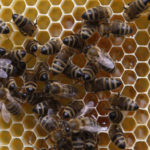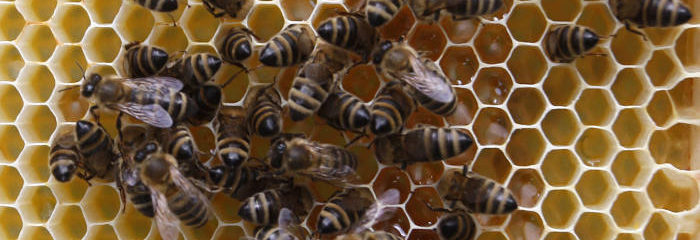 Our willingness to pay more for premium is causing counterfeit products to proliferate.
Our willingness to pay more for premium is causing counterfeit products to proliferate.
Please use the sharing tools found via the share button at the top or side of articles. Copying articles to share with others is a breach of FT.com T&Cs and Copyright Policy. Email licensing@ft.com to buy additional rights. Subscribers may share up to 10 or 20 articles per month using the gift article service. More information can be found here.
Wendell Steavenson –
In November, following a complaint by a member of the public, a jar of Tesco own-brand honey, costing £1.35 for 454g, was sent for testing and the results suggested it had been bulked out with sugar syrup. Tesco insisted, that its “honey is 100 per cent pure, natural and can be directly traced back to the beekeeper”, but nevertheless temporarily removed the product from their shelves. There was never any public health danger and the story soon sank beneath the headlines. When I checked on the Tesco website in mid-December their honey was back on sale. Food fraud — watering down wine, selling offcuts as prime — is as old as history. Once we used our own senses, sniffing, squeezing, tasting to check quality. Now we buy most of our food in restaurants and supermarkets, ready-prepared and wrapped in plastic. Much of our food is sourced through a long and complicated global supply chain of import-exporters, processors and distributors across multiple international borders. Packing slips slip, countries of origin blur. We may try (when we can afford it) to buy “local”, “free-range’ or “artisanal”, but our willingness to pay more for premium has engendered a proliferation of counterfeit products. Organic that is not, vegetarian meals made with meat products, farmed posing as wild. The olive oil trade is infamously rife with fraud. Substituting tilapia or pollock for expensive species like cod or turbot is endemic in restaurants all over the world. And in Britain, whenever a collection of takeaway curries and kebabs is tested, there is usually a pretty high incidence (between 10-50 per cent) of chicken or turkey masquerading as beef or lamb. Regulators are stretched thin. Following the discovery in 2013 of horsemeat in several brand-name ready-meals sold in British and Irish supermarkets, the Food Standards Agency set up the investigative Food Crime Unit. Last year, more than 1,000 cases were referred to it; only a handful of prosecutions have been brought. Ninety per cent of honey in Britain is imported and, according to Interpol, roughly a third of all honey sold in the world has been adulterated one way or another. Bees can be fed sugars to increase production and honey can be flavoured with artificial flavours, darkened with resin, and diluted with glucose, high fructose corn syrup or sugar beet; multi-floral honey might be labelled as single-flower — acacia, clover, orange blossom. Commodity honey is often ultra-filtered, removing the pollen, which makes it impossible to genetically identify its geographic origin and under EU definitions, not legally honey. High value and non-perishable, honey is an obvious target for counterfeiters. There is no single method for authenticating honey, fraudsters are one step ahead of regulators and trusted brands from Australia to Canada have been showing up with added syrups. China is the largest producer of honey and there have been historical issues of contamination with lead and antibiotics as well as repackaging and mislabelling. Chinese honey was temporarily banned by the EU in 2002; Indian honey, suspected to have been laundered from China, was banned in 2010. Much of Britain’s supermarket honey is labelled simply, “product of non-EU countries”. The sticky trail of dodgy honey leads back into the obscure hinterland of our food supply chains. Blockchain technology, initially designed to enable bitcoin, that can track an ingredient from farm to retail point, in the same way that your parcel is tracked through the post, is now being pioneered in the food industry and could provide a solution. At my local farmers’ market in Washington DC last week, I talked to an organic butcher who showed me how to scan the digital code on my steak to bring up information on the breed of cow, the farm and the date of packing. But the system is only as good as the information inputted and requires a costly software investment. Demand for honey is rising even as its production becomes harder to sustain environmentally. The number of bees dying of colony collapse is one of the more terrifying indices of the climate crisis. A single bee makes only a twelfth of a teaspoon of honey in its lifetime and it takes hundreds of thousands of bee flights to collect enough nectar to make a kilo of honey. Honey has almost magical properties; preservative and anti-bacterial, it can embalm bodies and heal wounds. We soothe coughs with it and drizzle it on toast. Honey has become an everyday staple, but it is really a luxury. Despite the fact we are increasingly questioning the provenance of our food, we have become accustomed to a cheap supply. Scrolling through customers’ comments on honey on the Tesco website, I saw that before the scandal, one person had complained of a “rather treacly taste”, perhaps astutely recognising that “this is a very cheap large jar of honey it’s OK but you only get what you pay for”.
The writer is author of a novel, ‘Paris Metro’

